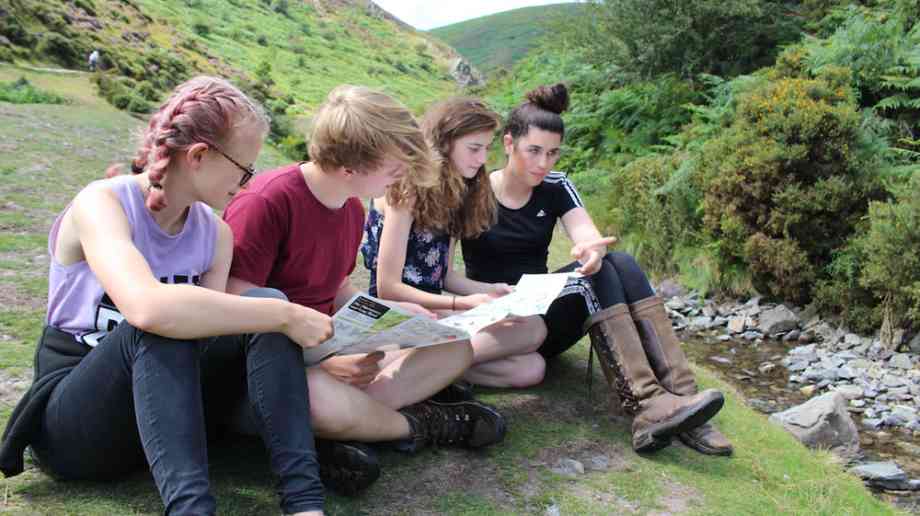
Outdoor learning and the new natural history GCSE
From 2025, students will be able to study a brand-new GCSE in natural history. Mark Castle, chief executive of environmental education charity, the Field Studies Council, explains why it marks a clear turning point for outdoor education
Learning outdoors and the benefits it brings to students has been talked about for many years, but it’s never quite got the attention it deserves in the national curriculum. That is, until now.
With the Government’s recent announcement that from 2025, students will be able to study a brand-new GCSE in natural history.
The launch of this new subject marks an extraordinary moment in the development of the GCSE curriculum and with it there shines a very bright spotlight over outdoor learning in general.
This new subject will of course give older secondary school learners the opportunity to study the natural world in greater depth and support them to develop the skills they will need to tackle critical global challenges such as climate change, biodiversity loss and sustainability.
But, at the same time, and perhaps more importantly, it gives us a huge opportunity to build and embed more outdoor learning into all aspects of the school curriculum for learners of all ages.
By capitalising on the energy and enthusiasm sparked by this landmark moment, we can together ensure primary and secondary school pupils are given the chance to connect with nature and that they are able to experience high quality outdoor learning as a core part of their time at school.
Children need to be given opportunities to be curious and passionate about the environment in which they live from a young age and as educators, we have a responsibility to ensure that it is not just those who go on to study this new GCSE, who get the opportunity to explore the natural world first-hand. It’s essential that opportunities exist right across the spectrum.
Enhancing the curriculum
Our work during the last 79 years has demonstrated that there is not a single subject on the curriculum that cannot be enhanced through hands-on, practical outdoor learning experiences and the overwhelming support shown for this new GCSE highlights that there is no better time for us to fully embrace the benefits of outdoor education and give it a chance to truly shine.
From improving literacy skills to boosting confidence in maths, when learners are immersed in nature, they become far more engaged, learn new skills and become critical thinkers.
What they’ve learned in the classroom suddenly makes sense. What was only a concept can become real and tangible. For example, climbing ropes becomes the new way to learn about angles in maths, stunning landscapes provide inspiration for new vocabulary, creative writing and the arts.
We are learning far more about the importance of nature connection and its role in helping learners reconnect and re-engage with learning and school, their teachers and their peers. We also know more about nature’s ability to boost learners’ mental health and wellbeing. Outdoor learning is one great multi-functional tool in the toolbox to help with the aftermath of Covid.
It’s these hands-on, real-life experiences that often ignite passion and curiosity – and from here springs the interest in our natural history and lifelong respect for the environment and the desire to impact on the challenges it is facing.
Sustainability and Climate Change Strategy
The Department for Education announced the new natural history GCSE in April as part of its Sustainability and Climate Change Strategy, which also included the development of a new National Nature Education Park and The Climate Leaders Award to help younger school children to become more connected to the natural world.
It has hopes for the UK education sector to become a world leader in climate change by 2030.
The new subject will be designed to give learners the opportunity to develop knowledge of the natural world from their own local wildlife and environments to developing understanding around bigger and more prominent global issues.
Its development has been no accident and is the result of a decade-long campaign led by naturalist Mary Colwell, with support from leading environmentalists such as the Eden Project’s Sir Tim Smit, broadcaster Baroness Floella Benjamin, teenage conservationist Kabir Kaul, and ‘urban birder’ David Lindo.
UK exam board OCR has also played a pivotal role in bringing the proposals to fruition following years of research alongside Cambridge University Press & Assessment.
A decline in opportunities
The Field Studies Council has also made important contributions to the campaign and supplied critical data analysis that demonstrated a long-term national decline in the number of opportunities that learners were being given to explore natural environments beyond their local surroundings.
There are many reasons for this decline including teaching pressures, curriculum change, transportation issues and school budget restrictions alongside the notion of school residential trips being seen as optional extras rather than an opportunity to cement learning in the classroom.
However, the government’s new strategy will finally help to embed outdoor learning into the curriculum more than ever and we are excited to be part of these plans as they develop.
Our education team will be working in partnership with the teaching profession and exam boards to create a range of courses and resources to support those who decide to study and teach the new subject when it becomes available.
As a charity, we have a network of field centres located across the UK that provide a diverse mix of nature-rich environments – from coastal cliffs to urban spaces – that will provide essential study grounds for those choosing to take the subject.
We already provide fieldwork courses for those studying GCSE and A-Level Biology, Geography and Ecology, but with the natural history GCSE having a much broader input from science, humanities and the arts, it gives us scope to develop a new and exciting range of courses with our expert tutors.
Sharing our own expertise, knowledge and resources with teachers and learners about some of the big issues facing our planet such as biodiversity loss and climate change is really important to us.
Carbon neutral
We have also been making our own great efforts to become carbon neutral. Back in 2019, long before the government mapped out its own road to net zero, we declared our climate emergency and committed to ambitious targets.
By 2020 we had already achieved over 65 per cent reduction in carbon emissions, which exceeded the initial 40 per cent target.
Switching to greener, off-grid sources of energy has been key to our success in reducing our carbon footprint. Efforts have also focused on building infrastructure and managing heat loss at centres, replacing our vehicle fleet with more energy efficient cars and reducing travel time for staff.
It’s only really the start of our journey, just like the government’s introduction of this new GCSE subject but, together, at long last, it does feel like we are making strides in the right direction to ensure environmental education is a priority for everyone.
Latest News
31/10/2025 - 10:12
A growing number of UK children are now eligible for Free School Meals (FSM), yet most still aren’t taking advantage of them on a daily basis, new research reveals.
30/10/2025 - 01:28
In the wake of the Raac crisis, the DfE spent £5 million on research into the condition of school buildings, which is due to conclude in spring 2026.
30/10/2025 - 01:09
Malmesbury Primary School in Wiltshire has submitted plans for a major expansion, funded by entrepreneur James Dyson.
30/10/2025 - 00:55
Monday's Every Pair Tells a Story campaign to protest to highlight the national crisis in SEND provision.
29/10/2025 - 09:19
Estimated data from the Department for Education reveals that 470,000 pupils under 16s use local authority funded transport to get to school.







